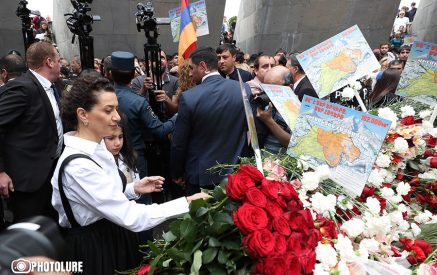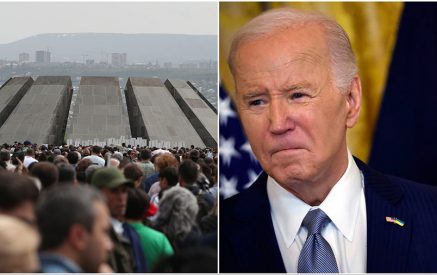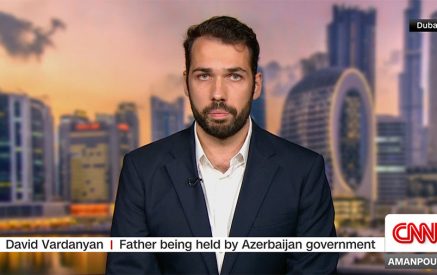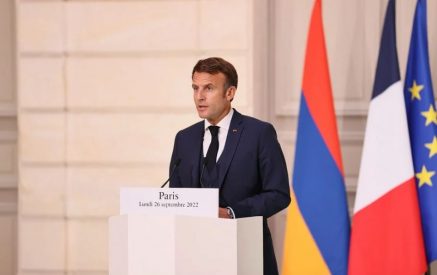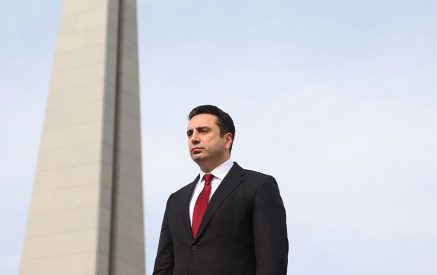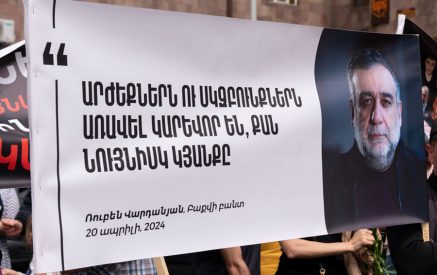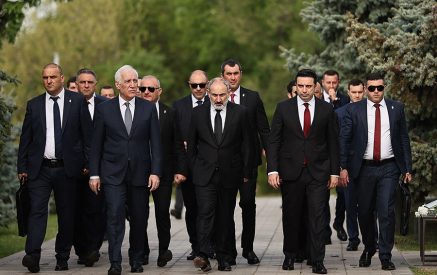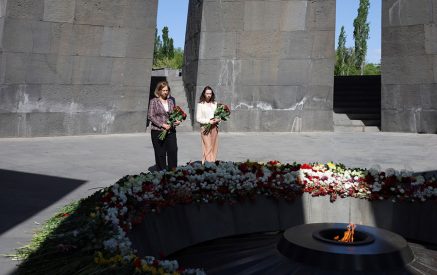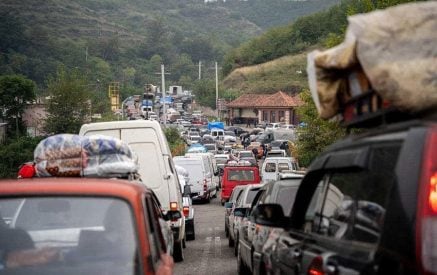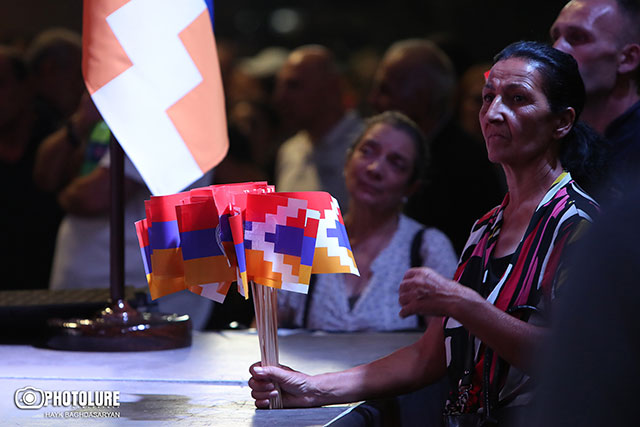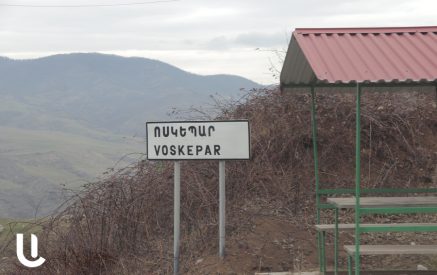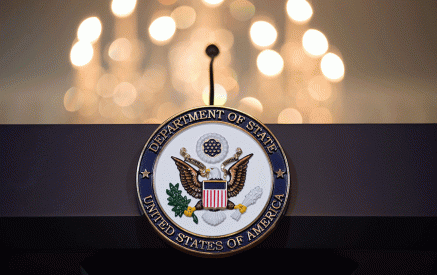By Dr. Arshavir Gundjian
Under different, normal conditions, it would be a commonplace effort to devote time at the start of a new year to examine in an impartial and unflinching fashion the events of the past year, both accomplishments and failures – the latter which of course we would not want to see repeated.
This time, however, the situation is much more serious. The informed part of the entire world-wide Armenian population, whether in Armenia, forcibly removed from Artsakh, or in the diaspora, at this point faces a much more urgent and weighty obligation of self-examination. Indeed, the stormy year we just completed, and especially its disastrous last months, shook our entire nation to its roots.
Read also
For a self-aware Armenian, it is not a year that has ended, but an entire era of the most bitter circumstances. That era began on the eve of the Genocide and continued for a whole century. During its course, the scattered remnants of the Armenian nation passed through the most serious milestones of the struggle for survival. During the seven decades of Soviet rule, thanks to the forcibly created internal peace, the country of Armenia was revived and it entered the ranks of civilized and advanced countries. During those seventy years, despite the difficult conditions created by a harsh regime, our people living in Armenia created art, science and culture worthy of national pride, and an intellectual manpower at the highest world level in all these fields, which gave reasons for pride to all Armenians around the world, including even those who were against the ruling regime. In those days, the demands of the Armenian people for our so-called “confiscated internal lands” turned into a nationwide movement of righteous protest. When suddenly, completely independent of our limited means, the opportunity arose to finally make Armenia politically independent, Armenians all over the world believed that the ideal moment had arrived to make their homeland even more prosperous. Indeed, the independent Republic of Artsakh was created by the heroic Artsakh movement, while many in Armenian diasporan circles believed that the homeland which would become a true lasting, and even eternal, anchor for Armenians, had been created.
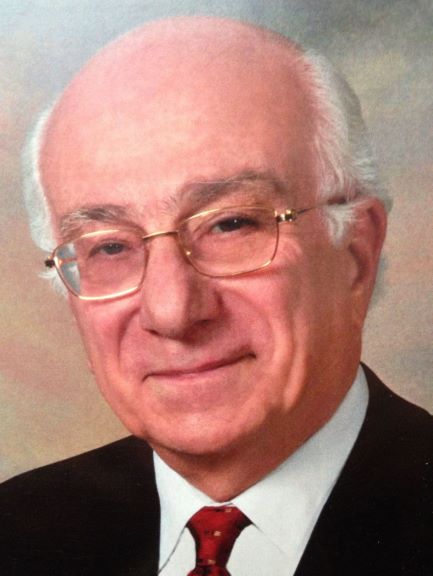
Arshavir Gundjian
While all this took place in the homeland, to the honor of the Armenian diaspora, that multimillion homeless community born from the Genocide, not having any means of security, instead of simply being pulverized and dissolving in the world’s huge ocean of alienation, succeeded, on the contrary, in accomplishing the impossible. In the course of the abovementioned many decades, numerous exceptionally prosperous diasporan communities were established, each with church, cultural and national political party structures. This is an incredible miracle. It is necessary to underline here that during those decades, the foundation and spiritual strength of this wonderful development was the bright reality I noted above, of a homeland’s existence and the profound confidence in the diaspora concerning its future.
Today, however, the Armenian world has been deeply shaken. After living through the last nationwide disaster period, it is now obvious that the condition of the Armenians, who were previously considered to have been in a “national revival,” contains serious structural cracks and weaknesses, to the point of being fatal. It is certainly as the result of these main weaknesses, which have been combined and further complicated, that in the last short period of time, Armenians have reached their current state, crushed, pitiful and stunned.
Indeed, while Armenia was in its current state of defenseless impotence, a merciless international military-political-diplomatic steamroller simply crushed and passed right over it!
The most alarming and dangerous concern of today is that the entire Armenian community is not only stunned, but it is also actually in a particularly confused state.
I will summarize the general situation as follows.
Unbelievably, Artsakh was emptied of its over one hundred thousand population, which had lived there for countless centuries, within a few hours. Armenia itself is insecure, bleeding on its borders, under the paw of the archenemy. On the one hand, with completely uncertain steps, it makes hesitant efforts for survival, while on the other hand, powerless, it watches the outflow of the despairing people which weakens it. The diasporan Armenians are helpless spectators watching this sad reality, in a collectively disorganized state.
At this dramatic point, all of us, dear compatriots, should undertake a serious self-examination. With a deep, bold and sincere approach, we should search for and find the main reasons behind our impoverished state today. Then, we should have the courage to implement the necessary and basic measures of reorganization, which can once again lead the Armenians around the world to recovery in the coming months and years and decades. The desired new renaissance must stand on practical, diplomatic, strategic and economic stable anchors.
The biggest question is how we should undertake this urgent titanic collective work. I am offering an open invitation to all Armenians, so that our intellectuals in various fields feel morally obligated and free to offer answers to this difficult issue.
Political scientists, diplomats, economists, sociologists, military scientists, and military experts all must participate in this vital work that requires nationwide participation. This enumeration of various fields in itself shows that such a large-scale work requires first of all having today’s working regime in Armenia as the main participant and organizer. For this purpose, the latter should create an organizing body that inspires confidence: in other words, with the participation of Armenian and diasporan residents, create a professional National Strategy Department or Ministry.
Therefore, we have no choice but to wait for this milestone and expect that soon we will start hearing responses to this challenge.
However, I will take the initiative in very broad lines to list and describe the deep weaknesses and cracks in our current national structures, which, in my opinion, were the main reasons why our country was so weak in the past period in the international arena, and was unable to show any real resistance to the terrible plots against it.
The first and greatest failure was a shameful diplomatic and military unpreparedness, and as its consequence, the loss of Artsakh. While thirty years ago, that inseparable part of centuries-old historical Armenia regained its independence, today it has been completely lost.
It is equally reprehensible, unbelievable and shameful that on the eve of that loss, until today, no significant Armenian plan is visible on the horizon to undertake an appropriate counterattack and try to regain control of what I consider to be incalculable human, cultural and national wealth. In the course of a few hours, it was destroyed and today it is in the predatory hands of the enemy.
The authorities of today are responsible for the loss of Artsakh as much as the so-called “former ones” of the past three decades. Our nation has reason to be deeply concerned, especially when its current leader is the one who first calmly announced to the world that “Artsakh is Armenia and that’s it,” and then barely a few months later, without blinking an eye, admits that “Artsakh is Azerbaijan and that’s it.”
Another and equally great unforgivable failure is that Armenia, exceptionally advanced during the Soviet regime in the fields of scientific and military productivity, as well as in the areas of military weapons production, after three decades of independence and under the leadership of various governments, fell to such a weak level that it first suffered a shameful defeat in the 44-day war, and after a few years, having resorted to no correctional measures, this time not only lost Artsakh completely, but also lost important parts of Armenia itself. Today, in an impoverished state, Armenia, as the only means of its security, is trying to rely on a document called a “Peace Treaty,” knowing full well that such a piece of paper has zero value for its hostile neighbor. Indeed, the enemy negotiating with Armenia face-to-face at the same time publicly and with impunity characterizes centuries-old Armenia as “Western Azerbaijan.”
Without strong military preparation, any such document is definitely worthless.
The next great national failure is the incompetent state of the Armenian world and especially Armenia in the field of international information. During the past thirty years, it has appeared continuously incompetent in convincingly creating public opinion regarding its rights and fair demands. Armenians around the world, and especially Armenia, do not have a single news network of international level and capacity. Among the joint priorities of Armenia and the Armenian world is the importance of filling this great lack. Indeed, in the course of the passing years, in addition to the tragic physical losses, it was an even more bitter psychological experience for us when the misinformed international press continuously called the Armenians of Artsakh, who are the real owners of their country, “separatists” who supposedly were terrorists who dismembered “poor Azerbaijan.” The diaspora has great untapped potential, especially concerning the creation of an international pro-Armenian press.
The list of these failures can certainly be extended much longer, but as the last of the major failures that are important on this occasion, I will mention the pitiful collective inability of the diaspora itself, because despite the great potential it contained, it remained in the position of a powerless spectator while its homeland was clearly being cut into pieces in the international circus. Though over the years, many communities and organizations with huge human, intellectual and material capacity were created in the Armenian diaspora, on the other hand, in practice, their collective capacity and therefore national strategic usefulness proved to be little more than nothing. The reason for this unbelievably poor result as a collective is undoubtedly its basically uncoordinated and therefore disorganized state. It is certain that the church, benevolent, cultural, educational, professional and other dozens of often large-capacity organizations, over time, instead of gradually strengthening each other in a cooperative way, on the contrary, have become separate and uncoordinated units. Each of them tries to justify itself with its special activity without even trying to compare itself with other organizations operating in its neighborhood. This situation is simply a waste of manpower, material and other resources.
At the cost of repeating his past proposals, the author sees an urgent demand to create a logical and workable structure with an initiative from the homeland and with the participation of the most important members of the diaspora that would create the possibility of coordinated activity. Indeed, it is completely self-deception to keep repeating that “While Azerbaijan is rich in its oil, Armenia is rich in its diaspora.” Various psychological obstacles must be overcome in order for such an important initiative to succeed.
It is really worth accomplishing this work. It is a condition for success that the initiative starts with the authorities of the Republic, but it is equally important that the patriarchs of the Armenian Church, as well as the heads of charitable, cultural and political organizations bring their blessing or unstinting cooperation.
In conclusion, and returning to the title of this article, which is a nationwide challenge, so that Armenia, Artsakh and the diaspora – the Armenian national collective – can honorably emerge from its current stunned and confused state, it is necessary that the current government of Armenia, the leadership of the various intellectual and political currents operating there, the supreme authorities of the Armenian Apostolic Church and the heads of the most important structures in the diaspora, can all show the ability and maturity commensurate with the positions they hold.
It is the future of our nation that will give a fair and strict assessment of the contribution that each of the abovementioned will bring to this extremely important national mission.
(The author, aside from his professional background as a scientist, is one of the longtime leaders of the diasporan Armenians. He is currently the president of the Central Board of the Tekeyan Cultural Association of the United States and Canada. For more than ten years, he has been the chairman of the Central Committee of the Armenian Democratic Liberal Party. He has been Armenian General Benevolent Union vice president for ten years. He is the founder and now the honorary chairman of the Diocesan Council of the Diocese of Canada of the Armenian Church. In addition to the many honorary titles awarded to him in connection with the above, he received the title of Member of the Order of Canada, the highest civilian state honor, of Canada, a few years ago.
The above article has been translated from the original Armenian text which appeared in Baikar.)










































